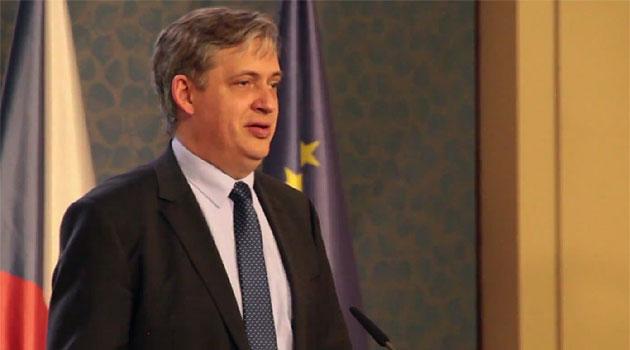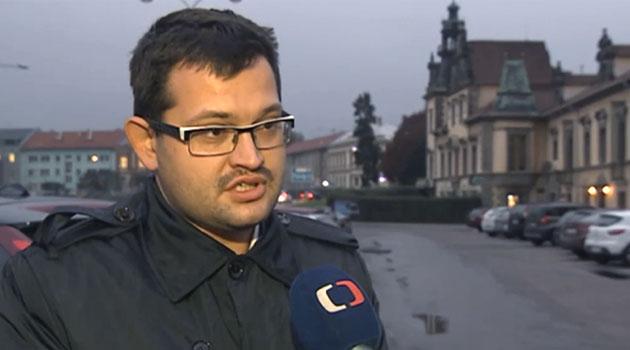The adoption of Government strategies on equality of women and men or on social inclusion, enforcement of measures against corruption, and the publicizing of planned legislation are all considered successes by outgoing Czech Minister for Human Rights and Legislation Jiří Dienstbier (Czech Social Democratic Party – ČSSD). He told the Czech News Agency that he believes his successor must see through the adoption of the amendment to expand the ombudsman’s powers and the negotiations to buy the pig farm located on the site of a former concentration camp for Romani people in Lety before next year’s elections.
Dienstbier’s team has not yet managed to draft a new law on social enterprises. Originally such legislaiton was planned to have been in effect by now.
“It’s too early to say what has failed. Some things are still in process. I would regret it if the law on the ombudsman were ultimately not approved, if the purchase of the pig farm at Lety was not finalized, or if the legislative processes regarding the amendment to the Constitution and the law about the Supreme Audit Office on auditing public finances ultimately resulted in rejection,” Dienstbier said.
The outgoing minister hopes his successor will complete as many of the tasks that are already underway as possible and will not stop them, adding that it is not possible to begin any new proposals during the rest of the term, as there would not be enough time to see them through. He said he had never heard any objections from the Prime Minister about his work.
Previously Dienstbier had alleged that pressure from within his own party was behind his departure from Government. The outgoing minister disagrees with the reproach that has been voiced about his work that voters found his concept of human rights incomprehensible and that he was defending the interests of selected groups only.
The outgoing minister mentioned his proposed legislation for the Government about children, the disabled, minorities, senior citizens and women. “We’re talking about practically all the citizens of the Czech Republic. Anybody who is serious about protecting human rights basically would not approach doing so in any other way. It is decidedly the case that you will not win general popularity by undertaking this work. If I were to have just sat in my office and enjoyed my ministerial post, that would have bothered fewer people,” Dienstbier said.
The outgoing minister said he knew when he took the job that he would not always have the support of politicians and the public for human rights topics, but despite that he submitted legislation to protect various rights to the Government. “If I hadn’t tried, if the debates had never been opened in the first place, then probably nothing would have changed. If you can get people, including politicians, to think about human rights, then you can achieve change. It is worthwhile submitting even matters that have no chance of success at that moment,” Dienstbier said.
The outgoing minister admitted that his team has not yet completed drafting the law on social enterprises that was supposed to have taken effect by now according to the Government program because the standards did not make it through the legislative council and the authors have had to redraft them. The human rights section still wants to resubmit the bill once it is ready.
According to Dienstbier, it is precisely thanks to the legislative council that the quality of the laws being drafted has managed to improve. More legal standards have been discussed and some returned for reworking prior to adoption than previously.
Among the anti-corruption measures reviewed, Dienstbier named the contract registry, the publication of proposed legislation on the Government’s website, changes in the financing of political parties, and the planned amendment on conflict of interest. He also said he considers it important to adopt the amendment to expand the powers of the ombudsman so that office will be able to file anti-discrimination lawsuits and follow whether people whose rights have been violated will see them upheld by the courts.
That bill has been in the Chamber of Deputies for quite some time now. Dienstbier also said the Government’s approved strategies on equality of women and men, Romani integration and social inclusion were ambitious.
“When it comes to concrete [implementation] measures, though, the support is no longer as apparent,” he complained, noting that while the Government may have approved strategy documents, it did not always support implementing measures for them in the draft legislation based on them. One such example is the proposed quota for 40 % representation of women, which was not ultimately supported.
Dienstbier said he considers quotas a temporary measure and a “somewhat unfortunate symbol”, but in his view many other steps are being successfully adopted, such as flexible labor law and an increase in the number of places available in nursery schools, that will help people balance care for their families with the demands of their employment. He also believes it is necessary to explain to people, including politicians, the need to protect the equality of people now living the country’s ghettos and to reintegrate them into society.
“That would be more appropriate for everybody. Such aid is not just for those living in exclusion, but for everybody else too. We can’t just throw these problems away, we will not export them to another continent, either we manage to integrate people or the situation will deteriorate,” Dienstbier said.
The outgoing minister expressed appreciation for local politicians who are dedicating themselves to inclusion even though the outcomes of their work will not be evident for years, and said he considers four particular pieces of legislation – an amendment to the law on the population registry so that places of permanent residence take into consideration people’s current residential addresses, free legal aid, social housing, and a system for debt relief – to be crucial measures with respect to social inclusion and the money that could be drawn on to achieve it. He also said he believes that while 100 % of the proposed measures might not manage to be fulfilled, progress will eventually be made.
Lastly, Dienstbier said negotiations with the owners on buying the pig farm at Lety located on the site of the Nazi Protectorate-era camp for Romani people there have progressed. He said resolving that unresolved situation is a debt owed to the victims of the Holocaust.

